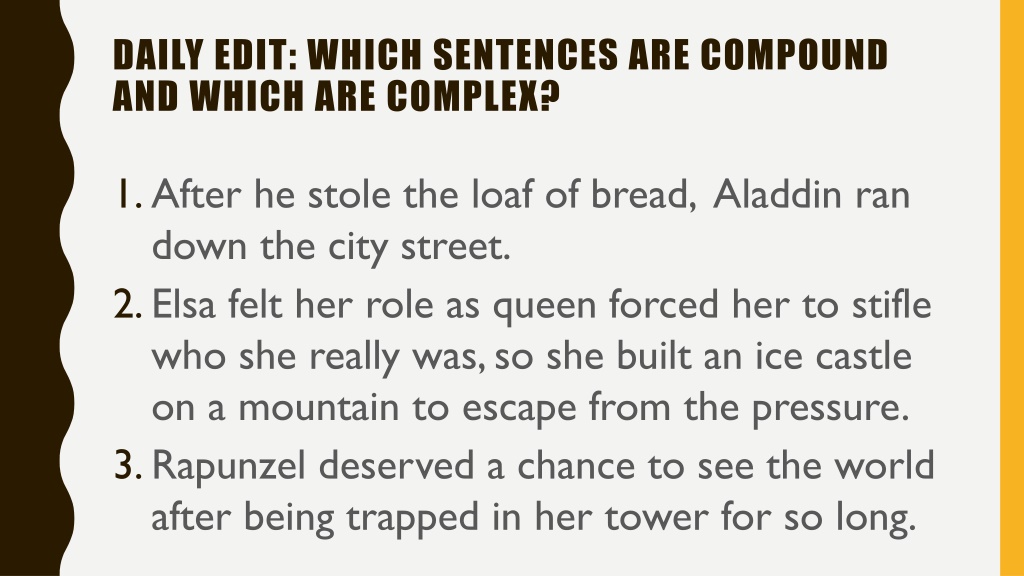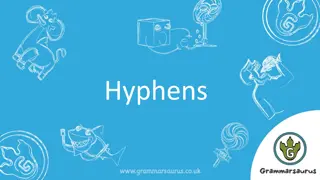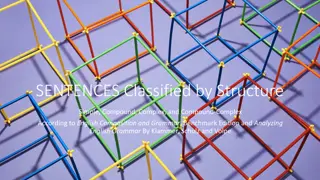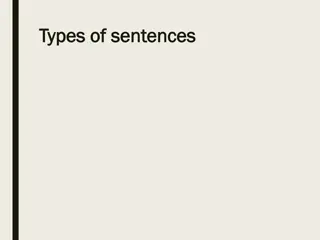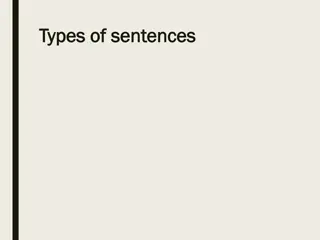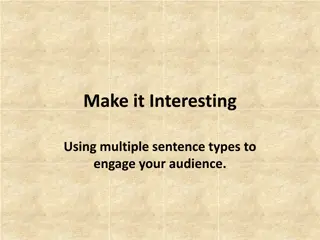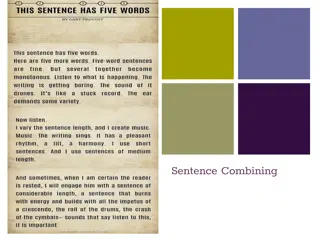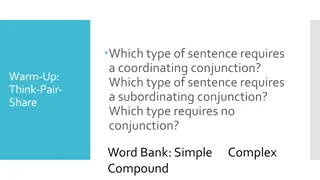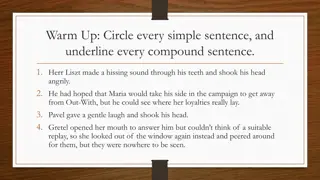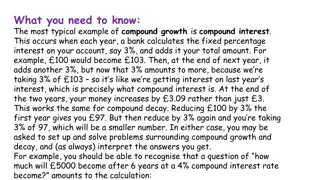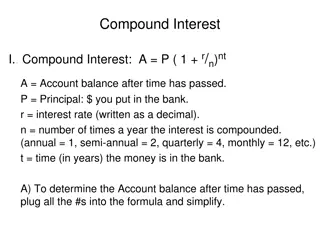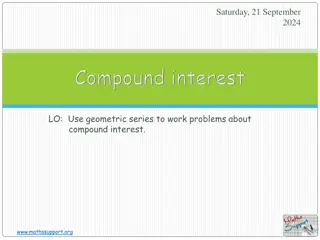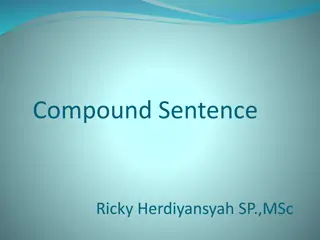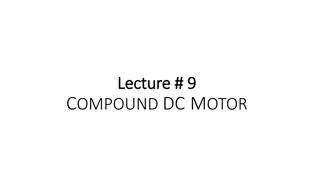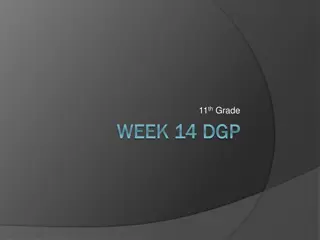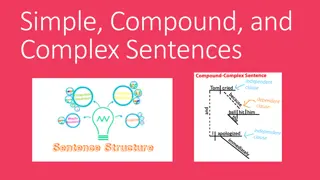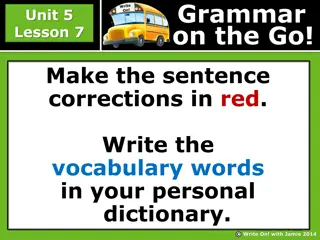Understanding Sentence Types: Compound vs. Complex
Learn to differentiate between compound and complex sentences by analyzing examples from famous fairy tales. Understand how dependent clauses impact sentence structures and practice combining sentences to create complex structures. Delve into the nuances of connotation and denotation in language usage.
Uploaded on Nov 12, 2024 | 0 Views
Download Presentation

Please find below an Image/Link to download the presentation.
The content on the website is provided AS IS for your information and personal use only. It may not be sold, licensed, or shared on other websites without obtaining consent from the author. Download presentation by click this link. If you encounter any issues during the download, it is possible that the publisher has removed the file from their server.
E N D
Presentation Transcript
DAILY EDIT: WHICH SENTENCES ARE COMPOUND AND WHICH ARE COMPLEX? 1.After he stole the loaf of bread, Aladdin ran down the city street. 2.Elsa felt her role as queen forced her to stifle who she really was, so she built an ice castle on a mountain to escape from the pressure. 3.Rapunzel deserved a chance to see the world after being trapped in her tower for so long.
COMPLEX SENTENCE A complex sentence is made up of an independent clause and one or more dependent clauses connected to it. After he stole the loaf of bread, Aladdin ran down the city street.
WHATS THE DIFFERENCE BETWEEN A COMPOUND SENTENCE AND A COMPLEX SENTENCE? Compound: Elsa felt her role as queen forced her to stifle who she really was, so she built an ice castle on a mountain to escape from the pressure. Complex: When Elsa felt her role as queen forced her to stifle who she really was, she built an ice castle on a mountain to escape from the pressure.
DEPENDENT CLAUSES After he stole the loaf of bread Remember, a clause must include a subject and a verb But it begins with a subordinate conjunction (after, although, as, because, before, even though, if, since, though, unless, until, when, whenever, whereas, wherever, while) which means it cannot stand on its own
COMBINE THE SENTENCES TO MAKE THEM COMPLEX: Liesel was far too full after eating too many apples. Liesel ate the pea soup anyway. Max felt horribly guilty for putting the Hubermans in danger. It was his only option. The Huberman s daughter, Trudy, came home for Christmas. The Hubermans did not tell Trudy about Max.
CONNOTATION AND DENOTATION
CONNOTATION: the an idea or feeling that a word invokes in addition to its literal or primary meaning A connotation may be positive or negative depending on the idea or feeling it invokes
DENOTATION: the literal meaning of a word (dictionary definition)
DENOTATION OF LULLABY A.a quiet, gentle song sung to send a child to sleep. B. Nice, comforting, happy, a positive word C.A song
DENOTATION OF LULLABY A.a quiet, gentle song sung to send a child to sleep.
CONNOTATION OF LULLABY A.a quiet, gentle song sung to send a child to sleep. B. Nice, comforting, happy, a positive word C.A song
CONNOTATION OF LULLABY B. Nice, comforting, happy, a positive word
FOR EXAMPLE, THE WORD MAN: Denotation: an adult, human male But let s think of some other words that also mean man but carry more connotations
MAN: AN ADULT, HUMAN MALE Other words that mean man :
TAKE OUT YOUR HOMEWORK 1. As I come around to check your homework, look at the quotes you identified and choose three words total from your sheet 2. Write these three on the back of your worksheet 3. Find the dictionary definition of each word using the dictionary at your table and write it next to the word 4. Then write down the idea or feeling that word invokes (its connotation), including if that word is more positive or negative in its connotation.
OVERGENERALIZATION: BASED IN CONNOTATIONS Lets look at two different words we use to associate people with children: Childish Childlike Which carries a positive connotation? Which carries a negative one?
CHILD-LIKE: POSITIVE Turn and Talk: How does this term overgeneralize the demographic group children what does it assume you associate with being like a child?
CHILDISH: NEGATIVE Turn and Talk: How does this term overgeneralize the demographic group children what does it assume you associate with being like a child?
DISCUSS How are connotations and denotations relevant to The Book Thief, propaganda, and the Nazi Party?
DISCUSS: Do you think connotations can be inorganically formed around words with the intent of changing the way people view others and themselves?
DISCUSS: Why would Zusak choose to have his characters use this kind of language right when Max is introduced?
RELATE THIS TO YOUR OWN LIFE Can you think of a time you were overgeneralized based on the connotations that surround your demographic identity? (Gender, Sexual orientation, race, religion, age, etc.)
HOMEWORK Read p. 243-255
